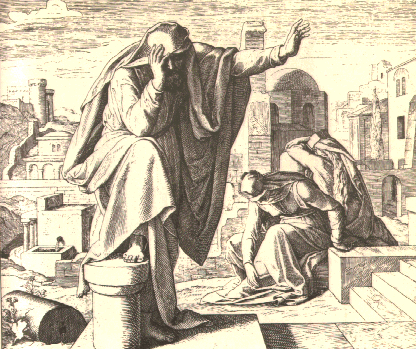Tears! Grief! Woe! Famine! Death! Pain! Jeremiah!
The book of Jeremiah "recounts more of his own life than any other prophet, telling of his ministry, the reactions of his audiences, testings, and his personal feelings. ... The main theme of Jeremiah is judgment upon Judah (chaps. 1–29) with restoration in the future messianic kingdom (23:3–8; 30–33)." (source )
Jeremiah also wrote the book of Lamentations, "No other entire OT book contains only laments, as does this distressful dirge, marking the funeral of the once beautiful city of Jerusalem. This book keeps alive the memory of that fall and teaches all believers how to deal with suffering." (source )
In the first two and a half chapters of Lamentations, a word that means lament, loud cries, Jeremiah records woe and distress unparalleled in all the bible. "Jeremiah wrote Lamentations as an eyewitness (cf. 1:13–15; 2:6,9; 4:1–12), possibly with Baruch’s secretarial help (cf. Jer. 36:4; 45:1), during or soon after Jerusalem’s fall in 586 B.C. It was mid-July when the city fell and mid-August when the temple was burned. Likely, Jeremiah saw the destruction of walls, towers, homes, palace, and temple; he wrote while the event remained painfully fresh in his memory, but before his forced departure to Egypt." (source)
Jeremiah opens Lamentations chapter 3 this way:
Not that Jeremiah personally was being punished for his sins, but that Jeremiah was eyewitness to the wrath that had come upon the Jewish people, who had refused to repent. Jerusalem was a smoking cinder and the people were carried away.
Jeremiah goes on for many more verses about his afflictions and woes. I can't even conceive of his hardships. When the siege of Jerusalem occurred, the people were starved to death, literally. Women killed and ate each other, even their babies. (Jeremiah 19:9; Lamentations 2:20;). It was tough and Jeremiah, sensitive to God and to his fellow people, was part of it all.
Jeremiah's frequent references to darkness is heartbreaking. Things are dark! Then in Lamentations 3:21 it all changes. Jeremiah turns a corner. How? Why? What can possibly get him out of his depression and distress? What can he possibly do or say or think that would lift him from the bible's nearly deepest recorded personal woe? He makes this statement in Lamentations 3:21,
"But this I call to mind, and therefore I have hope:"
What is Jeremiah calling to mind?
The attributes of God.
He recites the truth of the steadfast love of the LORD, His mercies, His goodness to those who wait on Him, and His salvation.
I can guarantee the following statement 100%: If you are in distress, and you choose to 'call to mind' our precious Jesus and His attributes, nature, and character, you WILL feel better.
How can I guarantee this? Because if you fix your thoughts on those things, 'call them to mind' as Jeremiah says, you are thinking the best thoughts you can possibly think. There is no thought that is better. No thought that is higher. No action that is more pure.
Jesus is the universe's greatest treasure. He is the unique individual of all the ages past, present and future. He is the purest, best, most majestic and wonderful Person of all, and all His attributes that come from Him are THE highest.
If you are afflicted with sorrow or trials, no matter what they are, do what Jeremiah did. Call those things to mind. Even better, preach them back to the LORD. Extol His virtues to Him and praise Him for those virtues.
You might try to lift yourself from a depressing time by thinking of your wedding day. Or your honeymoon. Or your last birthday party, or the most relaxing vacation you ever took. Or the accolade you just won at work. NONE of those happy things will ever come close to lifting you like it will if you ponder Jesus and His nature and attributes.
Because as I said, those thoughts are the top, best thoughts you can have. Nothing else compares.
Times are rough for many people now. I think of the Syrian Christians caught in the crossfire of the two-year civil war. Syrian dictator Bashar Al Assad has a point when he says "we are fighting rebels who eat their enemies' hearts." The situation must be very similar to the destruction of Jerusalem in Jeremiah's time. Pray for the Christians there to ponder Jesus all the more.
Even here in America, people are not adjusting well to their new economic circumstances and worried about their future. Many have received a report of cancer in their child or their parent. Many other events and circumstances worry us. However, lift your eyes to Jesus and deliberately call to mind his love, faithfulness, mercies, salvation and all the other wonderful attributes he possesses. If Jeremiah can do it, so can we. His book and the book of Lamentations is, in my opinion, in the bible to show us that no matter the suffering, He is so high and lifted up that when we fix our hearts and thoughts on Him, we will be high and lifted up too.
---------------------------
Further reading
What are the Attributes of God?
Divine Attributes of God, Spurgeon Archive
God: His Character and Attributes
The book of Jeremiah "recounts more of his own life than any other prophet, telling of his ministry, the reactions of his audiences, testings, and his personal feelings. ... The main theme of Jeremiah is judgment upon Judah (chaps. 1–29) with restoration in the future messianic kingdom (23:3–8; 30–33)." (source )
 |
| "Jeremiah Lamenting the Destruction of Jerusalem" (Rembrandt) |
Jeremiah also wrote the book of Lamentations, "No other entire OT book contains only laments, as does this distressful dirge, marking the funeral of the once beautiful city of Jerusalem. This book keeps alive the memory of that fall and teaches all believers how to deal with suffering." (source )
In the first two and a half chapters of Lamentations, a word that means lament, loud cries, Jeremiah records woe and distress unparalleled in all the bible. "Jeremiah wrote Lamentations as an eyewitness (cf. 1:13–15; 2:6,9; 4:1–12), possibly with Baruch’s secretarial help (cf. Jer. 36:4; 45:1), during or soon after Jerusalem’s fall in 586 B.C. It was mid-July when the city fell and mid-August when the temple was burned. Likely, Jeremiah saw the destruction of walls, towers, homes, palace, and temple; he wrote while the event remained painfully fresh in his memory, but before his forced departure to Egypt." (source)
Jeremiah opens Lamentations chapter 3 this way:
"I am the man who has seen affliction
under the rod of his wrath;
2 he has driven and brought me
into darkness without any light;
3 surely against me he turns his hand
again and again the whole day long.
4 He has made my flesh and my skin waste away;
he has broken my bones;
5 he has besieged and enveloped me
with bitterness and tribulation;
6 he has made me dwell in darkness
like the dead of long ago."
Not that Jeremiah personally was being punished for his sins, but that Jeremiah was eyewitness to the wrath that had come upon the Jewish people, who had refused to repent. Jerusalem was a smoking cinder and the people were carried away.
Jeremiah goes on for many more verses about his afflictions and woes. I can't even conceive of his hardships. When the siege of Jerusalem occurred, the people were starved to death, literally. Women killed and ate each other, even their babies. (Jeremiah 19:9; Lamentations 2:20;). It was tough and Jeremiah, sensitive to God and to his fellow people, was part of it all.
Jeremiah's frequent references to darkness is heartbreaking. Things are dark! Then in Lamentations 3:21 it all changes. Jeremiah turns a corner. How? Why? What can possibly get him out of his depression and distress? What can he possibly do or say or think that would lift him from the bible's nearly deepest recorded personal woe? He makes this statement in Lamentations 3:21,
"But this I call to mind, and therefore I have hope:"
What is Jeremiah calling to mind?
The attributes of God.
He recites the truth of the steadfast love of the LORD, His mercies, His goodness to those who wait on Him, and His salvation.
I can guarantee the following statement 100%: If you are in distress, and you choose to 'call to mind' our precious Jesus and His attributes, nature, and character, you WILL feel better.
How can I guarantee this? Because if you fix your thoughts on those things, 'call them to mind' as Jeremiah says, you are thinking the best thoughts you can possibly think. There is no thought that is better. No thought that is higher. No action that is more pure.
Jesus is the universe's greatest treasure. He is the unique individual of all the ages past, present and future. He is the purest, best, most majestic and wonderful Person of all, and all His attributes that come from Him are THE highest.
If you are afflicted with sorrow or trials, no matter what they are, do what Jeremiah did. Call those things to mind. Even better, preach them back to the LORD. Extol His virtues to Him and praise Him for those virtues.
You might try to lift yourself from a depressing time by thinking of your wedding day. Or your honeymoon. Or your last birthday party, or the most relaxing vacation you ever took. Or the accolade you just won at work. NONE of those happy things will ever come close to lifting you like it will if you ponder Jesus and His nature and attributes.
Because as I said, those thoughts are the top, best thoughts you can have. Nothing else compares.
Times are rough for many people now. I think of the Syrian Christians caught in the crossfire of the two-year civil war. Syrian dictator Bashar Al Assad has a point when he says "we are fighting rebels who eat their enemies' hearts." The situation must be very similar to the destruction of Jerusalem in Jeremiah's time. Pray for the Christians there to ponder Jesus all the more.
Even here in America, people are not adjusting well to their new economic circumstances and worried about their future. Many have received a report of cancer in their child or their parent. Many other events and circumstances worry us. However, lift your eyes to Jesus and deliberately call to mind his love, faithfulness, mercies, salvation and all the other wonderful attributes he possesses. If Jeremiah can do it, so can we. His book and the book of Lamentations is, in my opinion, in the bible to show us that no matter the suffering, He is so high and lifted up that when we fix our hearts and thoughts on Him, we will be high and lifted up too.
---------------------------
Further reading
What are the Attributes of God?
Divine Attributes of God, Spurgeon Archive
God: His Character and Attributes

No comments:
Post a Comment